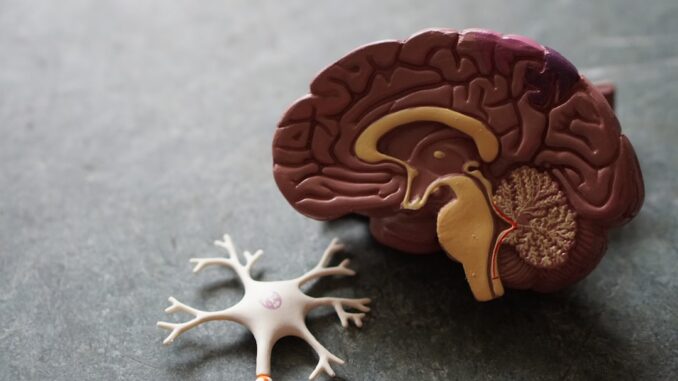
Summary
This article explores the link between shorter telomeres and an increased risk of stroke, dementia, and late-life depression. While telomere length doesn’t directly cause these conditions, it serves as a marker of biological aging and cellular stress. Importantly, lifestyle factors can mitigate the risks associated with shorter telomeres, offering hope for maintaining brain health as we age.
** Main Story**
Telomere Length and Brain Health: A Deep Dive
Recent research reveals a compelling link between shorter telomeres and an increased risk of stroke, dementia, and late-life depression. Telomeres, the protective caps at the ends of our chromosomes, naturally shorten as we age. This shortening process, however, can accelerate due to various factors, impacting our cellular health and potentially increasing our susceptibility to age-related diseases.
Understanding the Connection
A large-scale study using data from the UK Biobank, involving over 356,000 participants, investigated the relationship between leukocyte telomere length (LTL) – the length of telomeres within white blood cells – and the incidence of stroke, dementia, and late-life depression. The results showed that individuals with shorter LTL had an elevated risk for all three conditions. Specifically, compared to those with longer telomeres, individuals with the shortest telomeres experienced an 8% higher risk of stroke, a 19% higher risk of dementia, and a 14% higher risk of late-life depression. Overall, having shorter telomeres correlated with an 11% increased risk of developing at least one of these age-related brain diseases.
Telomeres: Not a Direct Cause, But a Key Indicator
Importantly, researchers emphasize that shorter telomere length doesn’t directly cause these brain conditions. Instead, LTL likely serves as a marker of underlying biological processes and cellular stress that often precede the onset of these diseases. This distinction is crucial, shifting the focus from telomere length as a causal factor to a valuable indicator of overall biological aging. This perspective empowers individuals to take proactive steps toward mitigating their risk.
The Power of Lifestyle
The study also highlighted the significant influence of lifestyle choices on mitigating the risks associated with shorter telomeres. Researchers used a “Brain Care Score” to assess participants’ modifiable risk factors, encompassing diet, exercise, stress levels, social interactions, and cardiovascular health.
Individuals with lower Brain Care Scores (indicating less healthy lifestyles) and shorter telomeres showed a substantially increased risk (11%) for the combined outcome of stroke, dementia, and late-life depression. Conversely, among those with high Brain Care Scores (reflecting healthier habits), shorter telomeres did not correlate with a heightened risk for any of the three brain diseases.
Implications for Geriatric Care
These findings carry profound implications for the future of geriatric care. LTL could potentially serve as a valuable tool for identifying individuals at higher risk of developing these age-related brain conditions, allowing for earlier intervention and preventive measures. This might include closer monitoring, personalized lifestyle recommendations, and therapeutic approaches tailored to an individual’s specific risk profile.
The Future of Telomere Research
While these findings are promising, further research is necessary to solidify our understanding of the complex relationship between telomere length and brain health. Future studies should explore the dynamic nature of telomere length over time, examining how changes in LTL correlate with disease progression. Additionally, investigating the specific mechanisms by which lifestyle factors influence telomere length and, consequently, brain health, will be crucial for developing effective interventions. Furthermore, expanding research to include diverse populations will ensure the generalizability of these findings and enable more inclusive approaches to geriatric care.
Hope for Healthy Aging
Despite the association between shorter telomeres and increased disease risk, this research also offers a message of hope. By embracing a healthy lifestyle, encompassing a balanced diet, regular exercise, stress management techniques, and strong social connections, individuals can potentially mitigate the risks associated with shorter telomeres. This underscores the empowering message that proactive lifestyle choices can significantly influence brain health as we age. As of today, March 7, 2025, these findings represent a significant step towards personalized and proactive geriatric care, emphasizing the crucial role of individual actions in shaping healthy aging.


The emphasis on lifestyle choices is encouraging. The “Brain Care Score” highlights the potential for individuals to positively impact their brain health as they age, regardless of telomere length. What specific lifestyle interventions show the most promise in influencing telomere length and overall well-being?
That’s a great question! Research suggests that diet, especially one rich in antioxidants, and consistent exercise routines can significantly impact telomere length. Stress reduction techniques such as mindfulness and yoga, and quality sleep are also beneficial. It’s an ongoing area of research, but a holistic approach seems key.
Editor: MedTechNews.Uk
Thank you to our Sponsor Esdebe
Given telomere length’s role as an indicator rather than a direct cause, what specific cellular mechanisms are most affected by shorter telomeres, leading to the increased risk of stroke, dementia, and late-life depression?
That’s a very insightful question! While the article highlights the correlation, diving into the specific cellular pathways is key. Research is ongoing, but altered DNA damage response and mitochondrial dysfunction are potential links. Exploring these mechanisms could unlock targeted interventions. Thanks for prompting this important discussion!
Editor: MedTechNews.Uk
Thank you to our Sponsor Esdebe
So, shorter telomeres don’t *cause* the problems, they just gossip about them happening? Does that mean a telomere lengthening clinic is less Fountain of Youth, and more very expensive rumour mill? Asking for a friend… who’s turning 30 (again).